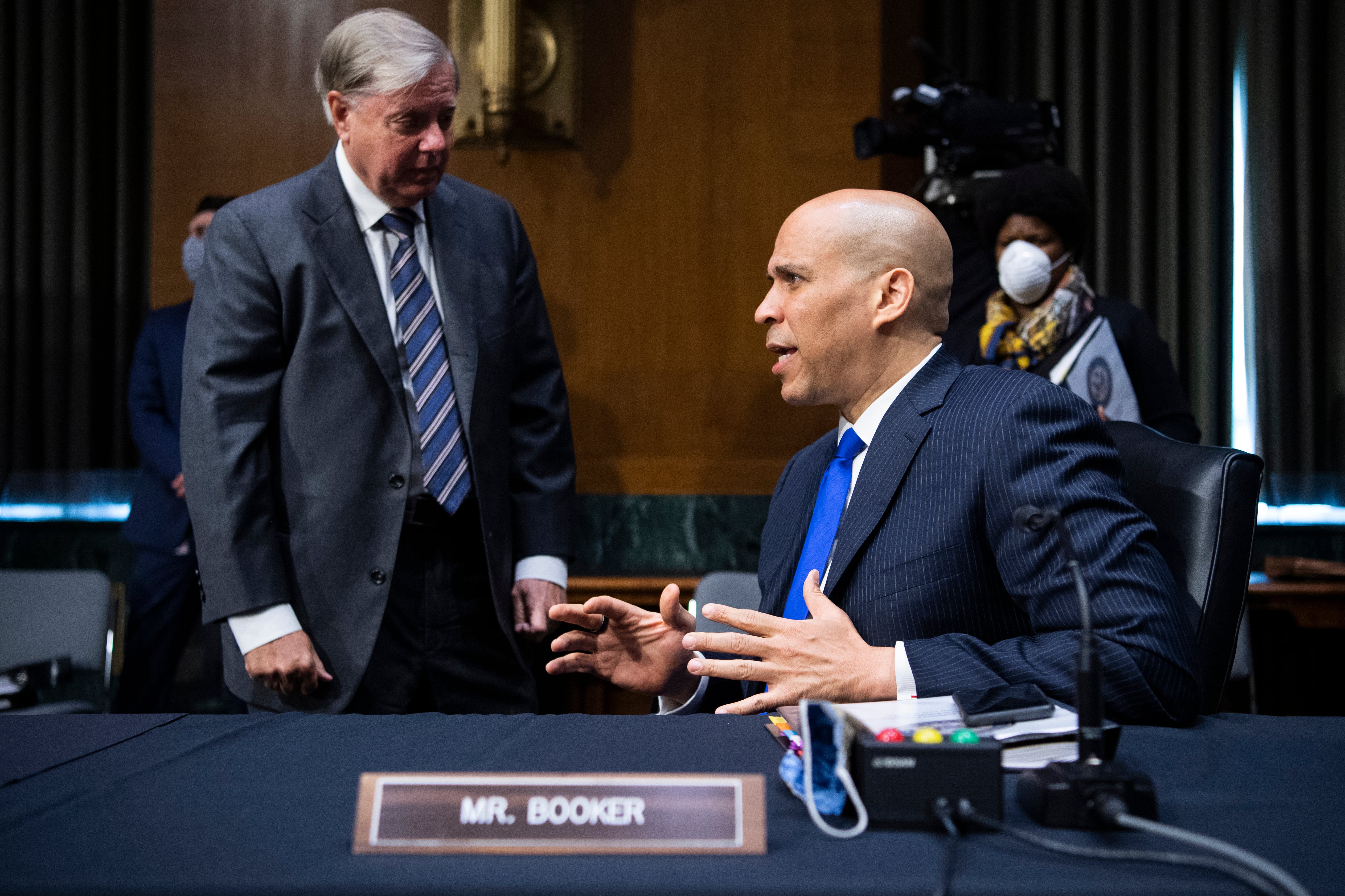McConnell, Manchin, Biden and Graham like it. So why is DC’s new gun deal a bitter pill to swallow?
Some juvenile justice and disability rights advocates have voiced grave concerns about the new gun framework, writes Eric Garcia


On Tuesday, Democratic Senator Cory Booker of New Jersey gave his Republican colleague Senator Lindsey Graham of South Carolina a fist bump. The two had plenty of reason to celebrate as they were part of a bipartisan team of 20 Senators who announced a deal on Sunday to address gun violence.
As of right now, no legislative text exists.
“We’re working on it right now, I don’t know” Mr Graham told The Independent. “Going to meet with folks tomorrow and we’ll see.”
But the framework currently includes a grant program to encourage states to adopt extreme risk protection orders, also known as “red flag laws”, to prevent people who pose a threat to themselves or others from obtaining a firearm; increased spending on mental health services for children and families as well as schools; increased spending for school safety such as training personnel and students; a clarification of the definition of a federally licensed firearms dealer; penalties for straw purchasing, wherein someone who can pass a background check purchases a gun for someone who can’t pass one; and an enchanced process for reviewing purchases for people younger than 21.
In addition, the legislation also closes what’s often called “the boyfriend loophole.” As of right now, domestic abusers who live with, are married to or have a child with their partner cannot pass a background check but abusers who do not live with their partner can do so.
Many gun violence prevention organisations such as Moms Demand and Everytown, as well as President Joe Biden, all praised the agreement, despite the fact it does not ban assault weapons or high capacity magazines and it does not raise the age for which people can purchase assault weapons. The negotiations were led by Republican Senators John Cornyn of Texas and Thom Tillis of North Carolina along with Democratic Senators Kyrsten Sinema of Arizona and Chris Murphy of Connecticut.
Democratic Senator Joe Manchin of West Virginia, who along with Republican Senator Pat Toomey of Pennsylvania, led the last failed effort on gun legislation in 2013 after the Sandy Hook massacre in 2012, said he was optimistic about the chances of the legislation passing
“I think really truly, John Cornyn and all the Republicans we have are just excellent, they’re trying to do everything in a responsible, reasonable way and they have a difficult challenge in the caucus to a certain extent, but you know, everyone’s working in good faith,” Mr Manchin told reporters.
When asked what made the shootings at Robb Elementary School in Uvalde, Texas and at a supermarket in Buffalo different from the shooting in Sandy Hook, he said, “I think people have had enough.”
“It’s pervasive, as if now it’s a norm and people are getting desensitised to it”, he said. “And there’s no way you can desensitise, an open game, I mean an open season on children.”
Senate Minority Leader Mitch McConnell – who had initially instructed Mr Cornyn to begin negotiations with Democrats – appeared to give his blessing for the legislation during Senate Republicans’ weekly news conference.
“For myself, I'm comfortable with the framework and if the legislation ends up reflecting what the framework indicates, I'll be supporting,” he told reporters.
At the same time, while some Democrats were happy that the Senate could come to some agreement, others said it didn’t go far enough.
“Something is better than nothing”, Senator Elizabeth Warren of Massachusetts said.
Riya Saha Shah, managing director of the Juvenile Law Center, told The Independent that she is concerned about the reviewing process for people under 21 who might want to purchase a firearm, specifically because it would require an investigative review of mental health records, including for state databases and with local law enforcement databases.
“So with regards to this particular provision, our concern is the information they might be looking for is likely to appear on a background check and so, further opening otherwise confidential or expunged records is really just going to harm others who are most affected by gun violence or who are more prevalent in our juvenile justice system”, she told The Independent.
Representative Alexandria Ocasio-Cortez told CNN on Sunday that she was also concerned about the focus on criminalisation. On Monday, she expanded on her concerns.
"I want to explore the implications of that and how specifically it’s designed and tailored”, she told The Independent. Ms Ocasio-Cortez said that in the years since the shooting at Columbine High School in Littleton, Colorado, in 1999 schools have seen an increase in law enforcement, which didn’t necessarily make schools safer.
“And while it didn’t prevent many of the mass shootings that we’ve seen now, it has increased the criminalization of teens in communities like mine”, she said.
At the same time, Ms Ocasio-Cortez said she was encouraged that the framework would close “the boyfriend loophole.”
One disability rights activist who is also a volunteer for a major gun violence prevention organisation also expressed concern about how the framework links mental health to gun violence.
“In my opinion that is the opposite of what we need to be doing. We know kids aren’t ok because gun violence is causing trauma to kids and covid is causing trauma to kids,” they told The Independent on the condition of anonymity.
“I know that I want to prevent gun violence just as much as anyone else. It feels wrong to just keep some of us safe. We need to keep us all safe,” they said, especially saying they were worried it would put Black and brown students as well as students with disabilities at risk. “It’s not worth it to me to put them at a higher risk and possibly cause more death.”
At the same time, some progressives, like Representative Ilhan Omar said she would wait to see what the results would be and said she did not think there would be over-focus on criminalisation.
“I don’t think so, because the criminal background check is about preventing them from obtaining weapons,” Ms Omar said in response to concerns about criminalization. “And we certainly do not want weapons in the hands of juveniles to begin with, and we certainly don’t want them in the hands of someone who’s exhibiting criminality.”
Join our commenting forum
Join thought-provoking conversations, follow other Independent readers and see their replies
Comments


Bookmark popover
Removed from bookmarks